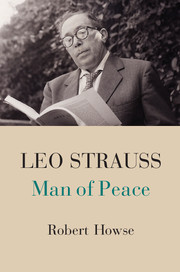Book contents
- Frontmatter
- Dedication
- Contents
- Preface and Acknowledgments
- 1 Introduction
- 2 Warrior Morality and the Fate of Civilization
- 3 Legitimacy and Legality, Thinking and Ruling in the Closed Society and the World State
- 4 Strauss’s Machiavelli
- 5 Thucydides versus Machiavelli
- 6 Justice and Progress
- 7 Conclusion
- Abbreviations
- Index
- References
4 - Strauss’s Machiavelli
Fallen Angel and Theoretical Man1
Published online by Cambridge University Press: 05 September 2014
- Frontmatter
- Dedication
- Contents
- Preface and Acknowledgments
- 1 Introduction
- 2 Warrior Morality and the Fate of Civilization
- 3 Legitimacy and Legality, Thinking and Ruling in the Closed Society and the World State
- 4 Strauss’s Machiavelli
- 5 Thucydides versus Machiavelli
- 6 Justice and Progress
- 7 Conclusion
- Abbreviations
- Index
- References
Summary
Introduction
In his Thoughts on Machiavelli, Strauss provides an extended account of Machiavelli’s break both with Christian morality and classical political philosophy, which is essential to understanding Strauss’s view of the origins of modern philosophy’s flirtations with political violence. Strauss presents Machiavelli’s teaching as forceful and seductive. Machiavelli’s revolt against the Bible and the classics is derived from a serious moral concern: Christianity makes demands not consistent with the basic needs of political society – indeed, that men may not be able to satisfy in the here and now without martyring themselves. On the other hand, classical political philosophy (as represented above all by Socrates/Plato) is concerned with utopias and apparently gives little guidance as to how one can practice virtue in the presence of the harsh necessities of real political and social life, above all, war.
Strauss makes the classical moral political outlook (as he understands it) speak openly with Machiavelli in answer to his concern, whereas the classical political philosophers themselves had spoken reticently on the theme of political violence, so reticently that Machiavelli dismissed them as dreamers. But Strauss admits the partial validity in Machiavelli’s objection to the classical political philosophers: their apparent neglect of the reality of war and conflict in favor of the quest for the city at peace or rest, the perfect city. To make the classic moral political outlook answer Machiavelli on war and necessity, Strauss goes beyond the writings of Plato and Aristotle to political writers who (like Machiavelli himself) were explicitly or obviously men of action, not dreamers: Xenophon and above all Thucydides, Strauss’s treatment of whom will be the subject of the next chapter.
- Type
- Chapter
- Information
- Leo StraussMan of Peace, pp. 82 - 122Publisher: Cambridge University PressPrint publication year: 2014



